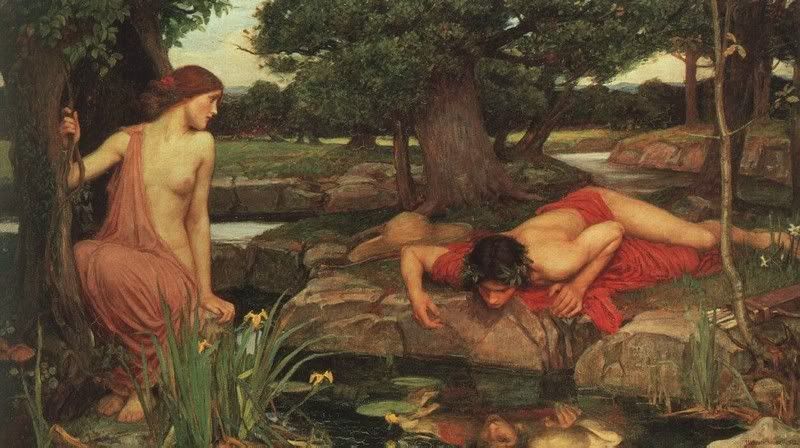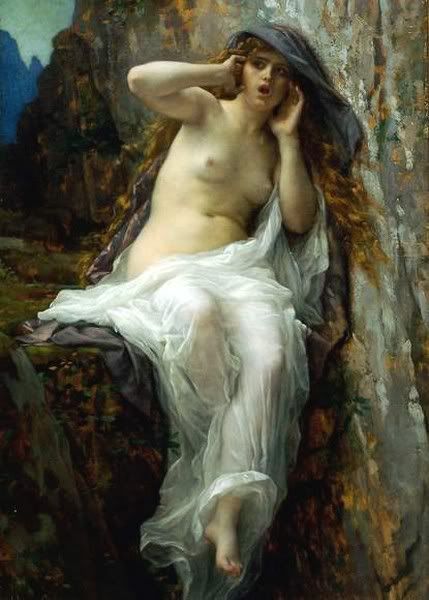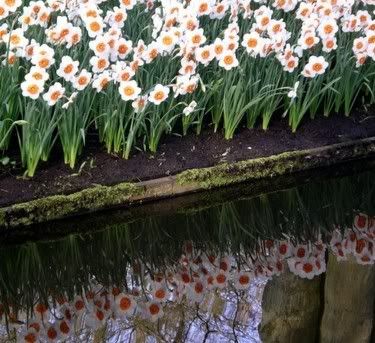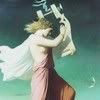
('Echo and Narcissus', John William Waterhouse)
According to Ovid's Metamorphoses, Narcissus was a hero (a demigod) who lived in Thespiae. He was the son of the river-god Cephissus and the nymph (minor goddess of nature) Liriope. Narcissus was extremely good looking, and his mother, who was worried about the well-being of such a beautiful child, consulted the blind prophet named Tiresias regarding her son's future. Tiresias then told her that Narcissus would live a long life as long as he never knew himself, something Liriope didn't understand at the time. However, the prophecy eventually proved to be correct.
As a young man, the beautiful Narcissus was also very vain, and scorned every one of his suitors, as he found that nobody was beautiful enough for him. To rebuff one of his admirers, Ameinias, Narcissus gave him a sword, which Ameinias used to kill himself on Narcissus's very doorstep. However, before dying, Ameinias prayed to Nemesis (the spirit of divine retribution) that Narcissus would one day know the pain of unrequited love. The curse was fulfilled when Narcissus fell in love with his own reflection in a pool of water, seeing himself for the first time. In some accounts, realizing he couldn't act upon that love, he then took his own sword and killed himself; in others, he drowned trying to touch the image, or let himself die by staying by the pool, looking at himself.
 ('Echo', Alexandre Cabanel)
('Echo', Alexandre Cabanel) Ovid's tale, however, links Narcissus with Echo, a talkative or gossipy mountain nymph. When Zeus (the king of all the gods) visited Earth to court the beautiful nymphs, she would sometimes distract his wife Hera (goddess of women and marriage) with long, entertaining tales. Hera, who had become suspicious of her husband's activities, came down to Earth in an attempt to catch him in the act, and discovered Echo's mischief. To punish her, she took away Echo's voice, allowing her to repeat only the ending of what others said.
One day, in the woods, Echo saw the beautiful Narcissus and fell in love with him. She followed him, longing to address him, but she was unable to speak first due to Hera's curse. Finally, Narcissus noticed the sound of footsteps behind him and shouted "Who's there?". Echo, who could only answer back "Who's there?", finally showed herself and ran to embrace him. However, Narcissus pushed her away, as he did not find her beautiful enough to be with him, and told her to leave him alone.
Echo was so heartbroken that she spent the rest of her life moping in caves and gorges until only her voice remained.
Having heard Echo's prayer, the goddess Nemesis sent Narcissus his punishment: when he bent down to drink from a pool, he saw his reflection and fell in love with that beautiful boy.
An alternate take on Echo's story is that she was a great singer and dancer, and scorned the love of any man. Pan (a god of nature, shepherds, flocks, hunting and rustic music) was angered by this and instructed his followers to kill her. She was torn to pieces and spread all over the earth. Gaia (the goddess of the earth) received the pieces of Echo, whose voice remains repeating the last words of others. However, in some versions, Echo and Pan had two children, Iambe (a goddess of verse, particularly slightly vulgar humor, later transformed into a bird) and Iynx.

It is said that a flower grew where Narcissus died. A common English name for the flower is "daffodil", and is sometimes used for all the varieties. Likewise, the aural phenomenon has been named after the nymph Echo, since her story provided an explanation for it.
Pun intended, the two basic ways in which Narcissus died echo the death of his two admirers: Ameinias and Echo. In the first version, Narcissus stabbed himself with a sword, which is exactly how Ameinias died. In the second, the enamoured Narcissus wasted away by that pool of water, while Echo waned thinking about how she wasn't able to attain Narcissus's love until only her voice remained.



No hay comentarios:
Publicar un comentario